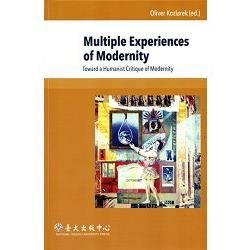Contemporary theories of modernity recognize the plurality or“multiplicity” of modernities, which are often differentiated in terms of their institutional or cultural elements. Although such approaches are important, they fail to provide a clear understanding of the“human consequences” of modernity. Critical Theory, in contrast, has always centered its interest precisely on those human consequences. This book goes further, and looks at (a) the experiences of human beings in, and within, global modernity, and (b) the affinities and differences we can identify in these experiences. Also, while Critical Theory has been mainly interested in Western experiences, this book addresses other parts of the world as well, in an intercultural perspective.
作者簡介:
Oliver Kozlarek researches and teaches at Universidad Michoacana de San Nicolás de Hidalgo in Morelia, Mexiko. His research focuses on modernity and globalization theories, critical theory, humanism and Latin American thoughts and ideas.
作者序
Oliver Kozlarek
Preface and Acknowledgements
This book is a result of my participation in the project “Humanism in the Era of Globalization, an Intercultural Dialogue in Humanity, Culture and Values” that was brought to life and directed by Jörn Rüsen. During the project, I learned a great deal about not only humanism but also, and perhaps more importantly, the ways in which concepts in the social sciences and humanities are applied, how they rise to become brilliant stars that shed their light upon almost every academic and intellectual field, and then how they become obsolete, unwanted and, consequently, fall into oblivion.
The second concept that illuminated my horizon as I intuitively began to conceptualize this book is that of modernity. Modernity is today a highly contested word. Some see in it a project, others a set of social imaginaries, still others even seem to suggest that the modern era has already passed, and that a postmodern age is taking over. Another argument is that modernity is a European invention, one that is highly Eurocentric.
The problem is that it is very difficult, if not impossible, to reject any of these ideas. We cannot say that post-modernists are wrong, or that only Habermas – with his defense of modernity as a still “incomplete project” – is right. How can we explain such a broad and, at times, contradictory range of meanings that are assigned to just one word? And how can we continue to defend such a fuzzy word if we wish to make sense of our contemporary world without renouncing academic ambitions?
In this book it is my contention that the broad range of possible interpretations of modernity is a consequence of the fact that different human collectivities have made different experiences with, and within, global modernity. As Jos Joaqu n Brunner claims: “[T]here is no such thing as a singular, prototypical experience with modernity, which would be situated outside and above the limits of geography, time, social class and local cultures”. The humanist approach to modernity for which this book pleads is interested, first of all, in these experiences that human beings are making as they grapple with the consequences and the challenges of modernity.
I must thank, first, Jörn Rüsen for encouraging this project. As a post-doctoral researcher on the project “Modernidad, crítica y humanismo”, Anna Popovitch has contributed very significantly to the book. Paul C. Kersey has been, once again, not only an important translator but also an indispensable and very skilful copy editor. Iwould also like to expressmy gratitude to Cristina Barrag n, who took on the challenging task of unifying the format of the different contributions to this book. Thanks are also due to the editors of the series Reflections on (In) Humanity, Sorin Antohi, Chun-ChiehHuang and Jörn Rüsen, for accepting this book. Last but not least, I would like to thank Mexico’s CONACyT or funding my project “Modernidad, crítica y humanismo” (CB 103958) and thus making this book possible.
Berlin, November 2013
Oliver Kozlarek
Oliver Kozlarek
Preface and Acknowledgements
This book is a result of my participation in the project “Humanism in the Era of Globalization, an Intercultural Dialogue in Humanity, Culture and Values” that was brought to life and directed by Jörn Rüsen. During the project, I learned a great deal about not only humanism but also, and perhaps more importantly, the ways in which concepts in the social sciences and humanities are applied, how they rise to become brilliant stars that shed their li...
目錄
Oliver Kozlarek
Experiences of Modernity and the Modernity of Experience
I. Conceptualizing Human Experiences
François Dubet
Society and Social Experience
Carlos Ímaz Gispert
Unfreezing the Subject. Subjectivity, Narrative and Socially-Contextualized Interactions
Anna Popovitch
From Ideology to Structures of Feeling. Raymond Williams on Culture and Society
Saurabh Dube
Unraveling Modernity: Subjects and Scandals
II. The Multiplicity of Human Experiences with and within a Global Modernity
Raewyn Connell
Antipodes. Australian Sociology’s Struggles with Place, Memory and Neoliberalism
Bidhan Roy
Imagining a World of inequality : Representing Class Identities in Hari Kunzru’s Transmission
III. Latin American Experiences
Luis Villoro
A Negative Path towards Justice
Nicola Miller
Incorrigibly Plural: Translating the Modern in Latin America, 1870 to 1930
Lidia Girola
Sociocultural Imaginaries of Modernity. Recent contributions and dimensions of analysis for the construction of a research agenda
Notes on Contributors
Oliver Kozlarek
Experiences of Modernity and the Modernity of Experience
I. Conceptualizing Human Experiences
François Dubet
Society and Social Experience
Carlos Ímaz Gispert
Unfreezing the Subject. Subjectivity, Narrative and Socially-Contextualized Interactions
Anna Popovitch
From Ideology to Structures of Feeling. Raymond Williams on Culture and Society
Saurabh Dube
Unraveling Modernity: Subjects and Scandals
II. The Multiplicity of Human Experiences with and within a G...












